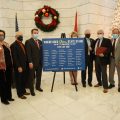National Average is 31.5%; Arkansas 21.8%
According to figures published by the National Conference of State Legislatures (NCSL), the Arkansas Lottery pays one of the worst percentages in the nation when it comes to proceeds as a percentage of ticket sales.
In Lottery Payouts and State Revenue, a report published by the NCSL in 2008 citing figures from state lotteries in 2006, state lotteries nationwide averaged 31.5% of ticket sales going to the states for designated purposes such as schools, highways or college scholarships. The rest was spent on prizes and administrative costs, including advertising.
While Arkansas did not have a lottery when the figures from other states were compiled in 2006, Arkansas Lottery Director Ernie Passailaigue reported in May of 2010 that 21.8% of Arkansas’ gross lottery proceeds were going for college scholarships. He said that he hoped to see that number rise to 25%.
Only three other states—Massachusetts (21%), Rhode Island (21%), and South Dakota (20.6%)—ranked worse than Arkansas. In Delaware and West Virginia, over 40% of their ticket sales went to the state, giving them the highest percentages in the nation. In Louisiana, state law mandates that at least 35% of lottery ticket sales be returned to the state. California, New Jersey, and Oklahoma also exceed 35%.
In 2010 the Arkansas Lottery, paying 21.8 cents on the dollar, helped provide just over $100 million in college scholarships for approximately 25,000 students. If the Arkansas Lottery would have paid the national average of 31.5%, it would have resulted in another $45 million in scholarships for 9,000 more students.
State-run lotteries are a poor means of funding college scholarships or anything else. Proponents of the Arkansas Lottery promised us a “world class” lottery. Instead, they’ve given us and the rest of the nation yet another example of Arkansas at the bottom. Only this time, there’s no Mississippi to thank God for. After all, they’ve been smart enough not to have a state-run lottery.



